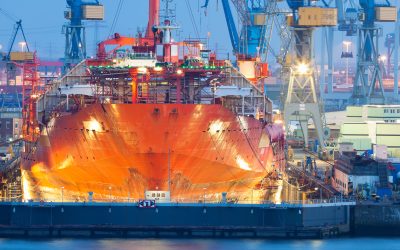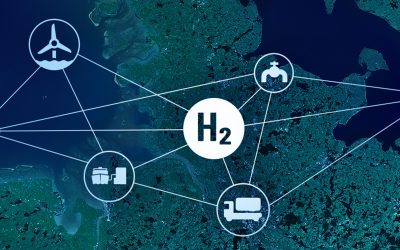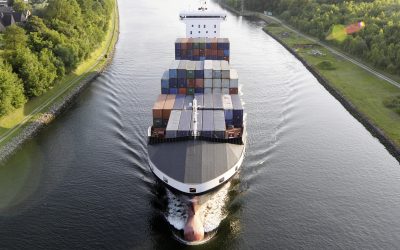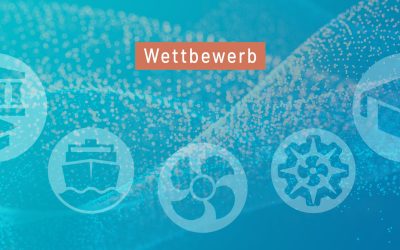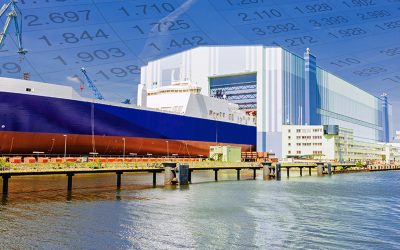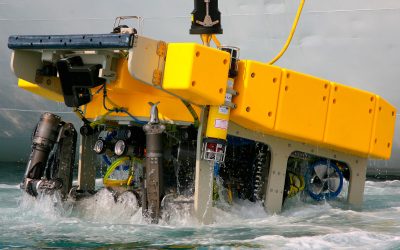
Capt. Runa Jörgens
Head of Issues and Projects/Shipping
Phone: +49 40 9999 698 - 71
E-Mail: Joergens[at]dmz-maritim.de
Starting point
Hydrogen is regarded as one of the most important energy sources of the future. Its potential uses have been discussed in various industries for several years. Alternatives to fossil fuels not only make sense from an environmental point of view but are also increasingly being used as a competitive brand.
The European Union’s recently published climate target, which aims to reduce greenhouse gas emissions by at least 55% by 2030 and has been promoted by the German government, requires the maritime industry to broadly and swiftly implement all available options to increase energy efficiency and to use alternative fuels, especially the provision of the necessary infrastructure. The expansion of the use of renewable energies on ships and of climate-neutral fuels are also important elements of a climate protection strategy.
In its National Hydrogen Strategy, published in the summer of 2020, the German federal government emphasised the versatility of hydrogen as an energy source and storage medium. Among other things, the strategy aims to create competitiveness, to establish hydrogen and hydrogen-based synthetic fuels as alternative energy sources, and to expand the transport and distribution infrastructure. Previously, the coastal states had already adopted a North German Hydrogen Strategy, which gives the seaports a central role in the import, production and distribution of hydrogen.
Hydrogen is becoming increasingly important in the maritime sector due to its diverse applications. However, to establish a hydrogen industry, it is necessary to specify the framework conditions, goals and measures.
In spring 2021, the German Maritime Centre commissioned the Institute of Shipping Economics and Logistics (ISL), together with its partners Sphera Solutions and GMW Consultancy, to conduct a study on this set of topics.
Objectives
The objective of the study was to identify the tasks for the maritime industry and public sector in establishing the hydrogen industry, from production to storage and transport to the consumer. It was also to consider the use of hydrogen technologies in ships and water vessels as well as the use of hydrogen in seaports.
For these purposes, the study looked at the conditions, key facts and figures and needs as they related to the goals of the National Hydrogen Strategy and the North German Hydrogen Strategy as well as to the implementation of the Wind Energy Act as amended in 2020. In addition, it identified necessary amendments or additions to laws and regulations for the production, use and transport of green hydrogen and hydrogen-based fuels as well as further research needs with regard to various hydrogen products as alternative propulsion means and fuels in maritime and inland shipping and ports, and as transport and transhipment goods. The role played by shipbuilding, shipping and ports in transport, handling, storage and use was also considered.
Results and recommendations for action
The study shows that considerable efforts are needed to be able to use hydrogen in the future. Germany will not be able to meet its demand for green hydrogen on its own. Imports via pipelines or tankers will be necessary. For imports, German seaports will play a central role in handling hydrogen and its by-products as well as for onward transport to the hinterland.
Shipping is also seen as an essential component of the logistics chain. Calculations have shown that transport by ship is quite competitive with transport by pipeline – and will become even more so as the transport distance increases.
For the German shipbuilding industry, the establishment of a new hydrogen industry offers the opportunity to enter new markets, as the solutions for transporting and storing hydrogen have not yet reached final market maturity.
The study also shows that hydrogen alone cannot cover future energy needs but can nevertheless be a good energy storage option. In all likelihood, a number of other fuels based on various power-to-X (PtX) technologies will establish themselves alongside hydrogen. These will depend on the drive technologies and areas of application.
To ensure that transport, transhipment and bunkering can also be implemented in practice, politicians and public administrations must create appropriate regulations. These can also serve as guidelines for the industry with regard to development services and investments.
Based on the above-mentioned results, the study formulates concrete recommendations for the spheres of politics, science and technology:
Politics
- Expand renewable energies and electrolysis capacity
- Conclude energy partnerships at an early stage
- Establish import infrastructures and suprastructures in line with demand
- Agree on uniform, internationally binding definitions
- Enact regulations for the use of hydrogen and PtX
- Seek engagement with and involve the general public
- Act quickly and decisively
Science
- Formulate recommendations for action early and precisely
- Draw up transport and import concepts for hydrogen
- Draw up application concepts for hydrogen technologies in ports
- Describe and define hydrogen hubs
- Design storage concepts for hydrogen
Technology
- Increase the efficiency of hydrogen and PtX production
- Increase technological maturity of maritime users
- Address the further use, retrofitting and supplementation of existing infra- and suprastructures
- Test different propulsion concepts and different fuels
- Develop new tanker vessels for hydrogen and PtX
The German Maritime Centre will take up the recommendations to further develop the topic of hydrogen in the maritime sector. The complete study (only in German) is available here.

